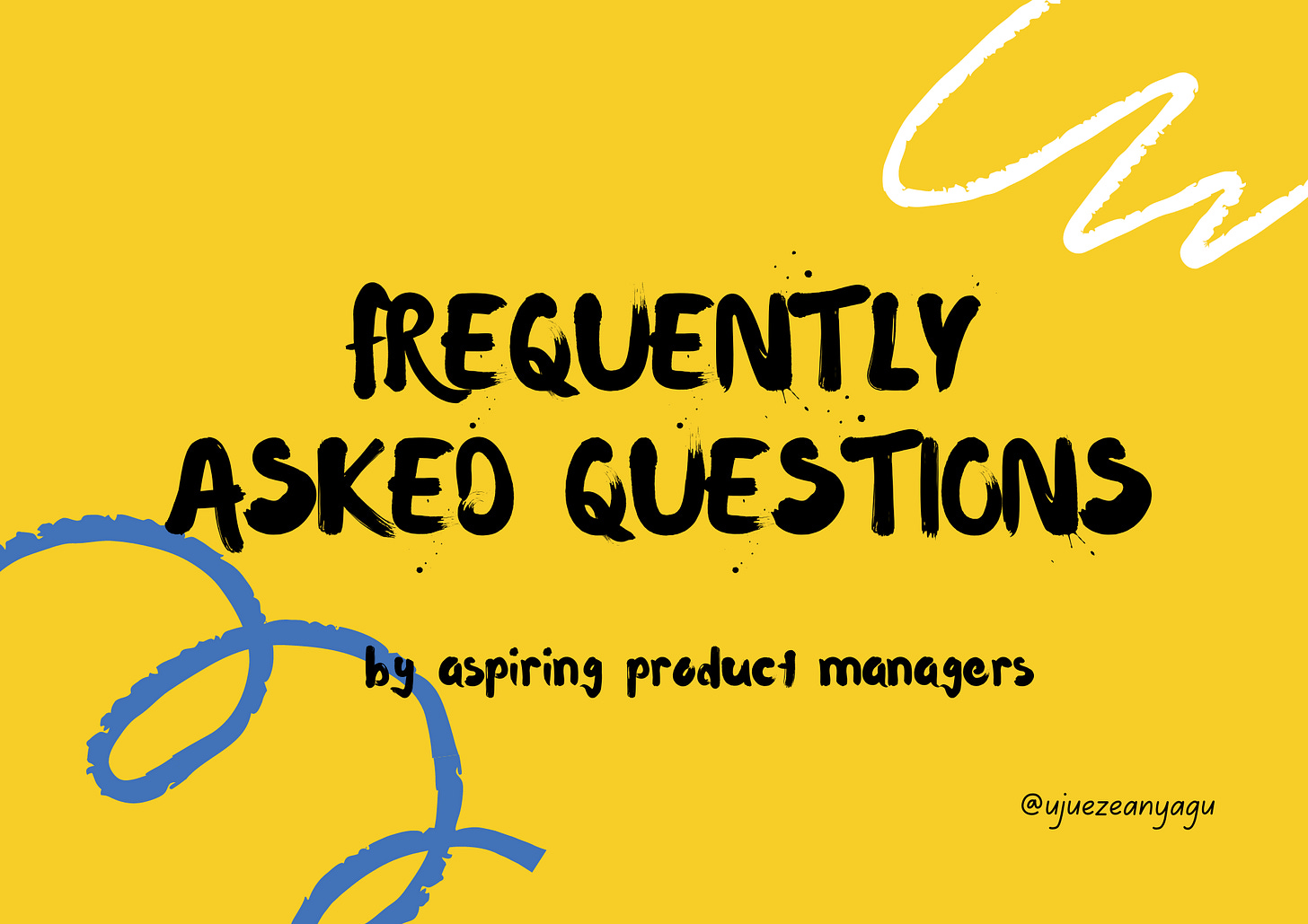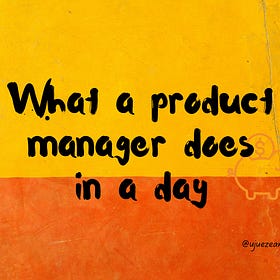Common questions by aspiring product managers, answered SIMPLY.
Transform your job search with these actionable tips.
In this article, we’ll address some common questions by aspiring product managers. If I miss anything, drop a comment, and I’ll respond.
What does a product manager do?
A product manager is a product strategist, product development manager and visionary all at the same time.
They oversee the development of a product from ideation to launch and scaleup while ensuring that it meets the target customer’s demands and achieves business goals. Read more here.
What skills are essential for a product manager?
Being a good product manager is less about knowing product management frameworks and more about building key soft and hard skills. Required skills for product managers are effective communication, problem-solving, strategic thinking, product design, and understanding of the product lifecycle. It’s also essential that product managers build basic technical skills such as data analysis and understand mobile and web development technologies.
Do I need a technical background to become a product manager?
The simple answer is No, you don’t. Anyone can become a product manager regardless of their background. Non-technical folks can succeed as product managers.
However, having technical skills helps you stand out amongst other entry-level candidates and increases your career prospects. Hence, even though you don’t need a technical background, it’s beneficial for you to gain basic technical skills such as data analysis and understand mobile and web development technologies. Free beginner courses are a great way to get started.
How can I gain relevant experience without a formal product management role?
You can build experience by volunteering and working on side (personal) projects. Fictional products are useful for demonstrating theoretical knowledge, but building a real product will be more rewarding. Connect with software engineers to build products or learn how to use no-code tools such as Bubble, Softr, and Flutterflow to build and launch products to the market. Ensure you track learnings and accomplishments during product development and launch that you can shout about in your portfolio and CV.
As an entry-level product manager, what should I include in my resume?
One great tip is to highlight relevant skills by listing them in a skills section on your CV and demonstrating them in your experience section. Add up to 3 product management certifications, especially if you don’t have a relevant educational background. Also, be very specific about what products you’ve worked on and your accomplishments. Don’t fill your CV with PM jargon or claims you cannot defend.
How do I build a strong portfolio for product management?
You can be picky about the products you work on and showcase on your portfolio. Choose projects that solve problems in your industry or a popular issue that interests many companies. Recruiters look for similarities between your experience and their organisation. Hence, working on similar projects often gives you an edge.
How do I transition from a different career into product management?
You can transition from any field to product management. You can transition to a product manager role if you work in a tech organisation. Let your manager know your intentions and work on a plan to transition when an opportunity opens up within the organisation. You might find transitioning within the same industry a little easier - your familiarity with the industry can give you an edge over other candidates. Volunteering and internship opportunities are also great ways to break into a new field.
Just because you do not have experience in product management does not mean you must start with entry-level product management. Professionals with some years of experience in another role have successfully transitioned to mid-level and senior-level product roles without previous product management experience. How you sell yourself makes all the difference - it’s important you demonstrate transferable skills and make a compelling case about your achievements to hiring managers.
I have ~ 2 years of experience as a product manager, but I am struggling to land a paid job. What should I do?
It’s possible to land a paid product manager job with less than two years of experience. Your success rate depends on your job application strategy. If you have been applying for jobs but have had no success, there are a few things you can explore.
1). Are you getting interviews for the jobs you’d like? If no, ask for feedback on your CV from product leaders and recruiters, revise your CV, and keep building your skills to stand out amongst other candidates. If you get interviews for the jobs you’d like but are unsuccessful, you’d need to improve your interview skills. You can schedule mock interview sessions to practise with others who can give you valuable feedback. It also helps to ask for feedback on your interview to identify skill gaps and record what you learned from the session. This is useful to track progress and prepare for other interviews.
2). Actively network with professionals who can connect you to the right opportunity or support you, especially if you are looking for entry-level roles. The opportunities are rare and get filled quickly because many candidates meet the requirements. Connecting with hiring managers helps you learn about opportunities early. Also, you'd have a direct link to pitch yourself, increasing the chances of getting an interview.
3). Find a mentor. Mentorship can help you identify areas for improvement and discover how to tackle them. ADPList is a great tool for free mentorship. You can also explore 1-1 mentorship from professionals you know and trust.
4). If you are still struggling after 6 - 12 months of investment (hopefully it doesn't get to this), I suggest you explore other jobs related to product management, such as product operations, program management, product specialist, etc., that can also be a suitable path to product management in the future.
How do I demonstrate transferable skills when transitioning into a product manager role in the same industry?
You’ve probably seen a lot of suggestions about demonstrating transferable skills when transitioning to a new career - but what’s the right way to do it?
Identify and document the skills you’ve gained from your previous role. Next, document all the skills required for a product management role. Finally, compare both lists. Which skills appear on both lists? Those are your transferable skills.
Now that you’ve identified your transferable skills, it’s time to share them proudly in your CV, cover letters, and interviews. Don’t focus on what you don’t have; focus on what you have. For example, if you have experience as a customer service representative, you’d have gained good communication and problem-solving skills. Demonstrate these skills in your CV (experience section) and other application materials.
Did I miss anything? Drop a comment, and I’ll respond. I hope this helps. xx
If you are new to product management, check out what I do in a day as a product manager. You don’t want surprises, do you?
A day in my life as a product manager
For the non-tech-savvy folks, it might be difficult to understand what a product manager does in their day-to-day work. Yet, you need to understand this before becoming a product manager. You don’t want surprises, do you? That’s why I am writing this article - to break down what a day in the life of a product manager looks like.
Join a free online community of aspiring and junior PMs. Learn from experienced PMs and recruiters, ask a question and get access to curated resources. Join here.
1-1 mentorship: Get 1-1 mentorship to land your first PM job or grow professionally as a PM. Navigate the 100s of templates and advice you see online and speak to an experienced professional excelling at her work and helping multiple folks land their first PM job. Email me at ezeanyaguuju@gmail.com to learn more and book a session.



